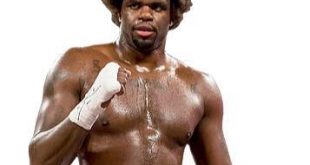WHEN WARRIORS CRY
By Scoop Malinowski
Boxing is a sport that has been characterized to be composed of an extra abundance of blood, sweat and tears. Often we see the blood and sweat aspects of boxing but we seldom witness the “tears” part of the equation.
However there have been numerous examples of great boxers losing control of their gamefaces and letting loose the tears. Perhaps the most famous moment of a great boxer losing his warrior demeanor was Buster Douglas moments after he beat Mike Tyson in Tokyo. When HBO’s Larry Merchant asked Buster a question about his recently deceased mother’s inspiration on his knockout victory was at a loss for words but the tears were flowing down his cheeks.
Another example I heard involved Leon Spinks at the Canastota Hall of Fame, during a hospital visit during induction weekend. Spinks had met a quadriplegic woman at the hospital who said she was a huge admirer of his. They met and talked for a while then about a half hour later, a photographer heard a strange noise in the parking lot. It sounded like a man crying out loud. And it was. It was Leon Spinks, by himself, sitting on the curb behind a car, crying his eyes out.
Even the great Sugar Ray Robinson was susceptible to extreme sensitivity regarding the squared circle. Robinson was at ringside the night Rocky Marciano fought Joe Louis. Seated in about the tenth row, Robinson was observed crying at the end of the bout, which featured Marciano knocking the well past his prime Brown Bomber through the ropes for a knockout win. Robinson could not stoically accept to see one of the mightiest champions in boxing history perform as a mere shell of his once great self.
One of the more recent incidents of heavy emotions happened in Detroit five years ago at the memorial tribute to Emanuel Steward. Both Thomas “The Hitman” Hearns and Iran Barkley were unable to complete their dedication speeches for Steward because they were both overcome by how much Emanuel had meant to them. They loved Emanuel to the point that they could not talk about it, they could only weep through deep feelings of anguish and loss and overwhelming respect and appreciation.
Andrew Golota is another famous boxer who had a sensitive side that most boxing fans had no idea existed. After a fatal car accident which cost the life of a friend – and badly damaged his left shoulder – Golota was in the gym trying to rebuild his boxing career and the wounded shoulder. But it would never be the same. Golota’s jab was forever permanently damaged and was only less than half as effective as it used to be, before the accident. One day in the gym while hitting the heavy bag, Golota realized and accepted this horrible truth. His left jab was gone and it would never ever be back. This devastating realization reduced Golota to tears inside the gym.
Oliver McCall was another heavyweight powerhouse who exhibited crying on the most important night of his career – but it was BEFORE he won the fight against Lennox Lewis to win the WBC Heavyweight title in London. McCall entered the ring first to the Diana Ross song “I’m Coming Out” and while on the way to the ring, McCall was actually crying. He continued to cry inside the ring as he waited for the hometown hero champion to arrive for combat in Royal Albert Hall. Two weeks later I interviewed McCall on the phone and I asked him why was he crying in the ring before the fight? I will never forget his reply: “Because I knew what I was about to do.” McCall knocked out Lewis with a single right hand punch in the second round, which was one of the biggest upsets of the decade.
I bet you didn’t know Pernell Whitaker cried at Madison Square Garden. After his brutal, physically punishing loss to Felix Trinidad, an hour after the fight, Whitaker was seen in one of the back hallways of the arena, with his entourage, crying in pain and agony. Trinidad’s wicked punching power had a very painful impact on his body.
Oh, I just remembered another example. A former top heavyweight boxer wrecked his left shoulder in a car crash and after surgery he lost range of motion and power and his jab was “about 50% of what it used to be.” When this boxer realized this grim reality of his now handicapped arm in the prime of his career, he cried like a child in the gym, uncontrollable tears. Boxing is a brutal business when you feel 100% perfect. With one arm at half capacity, any fighter is taking great risks and his chances of winning are substantially less. Needless to say, this boxer, never won a world championships despite three more title shots.
The last example is one I learned from a book about Jack Dempsey “A Flame of Pure Fire” by Roger Kahn. Toward the end of the book, Khan wrote about his memories of discussing the Gene Tunney fights with Jack. Jack revealed to the author that he never really felt entirely accepted by the public until he lost to Tunney. After the fight, with Jack standing beaten in the ring, a fan yelled out, “Jack you will always be our champion.” The random shout touched Jack and triggered an emotional reaction. Decades later, as he talked about it, Roger Khan wrote that he detected Jack had to hold back tears that this distant memory provoked in him. Then Jack composed himself and told Khan, “I want you to get to the readers that losing to Tunney was the making of me.”
 IBO Boxing Honesty and Integrity
IBO Boxing Honesty and Integrity



